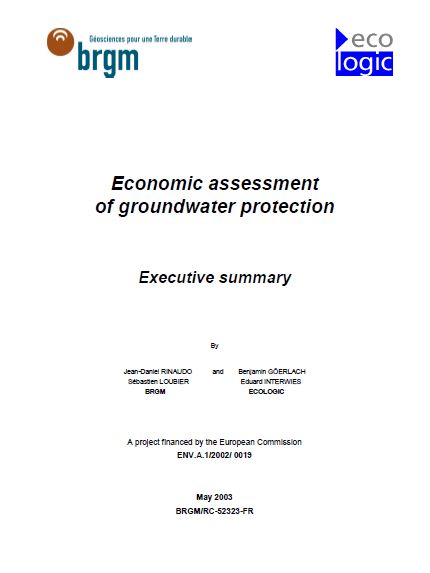The project discusses methods and estimates of the costs and benefits of groundwater protection. Ecologic contributed an extensive survey of the existing literature in the field, as well as EU Member States' experience with the use of economical methods and instruments in groundwater protection. The project supported the drafting process for the EC groundwater daughter directive.
The EU Water Framework Directive (2000/60/EC) supplements existing legislation by expanding the scope of water protection to all waters, surface waters and groundwater. It requires Member States to enforce appropriate measures to achieve good ecological and chemical status of all water bodies by 2015 (with the possibility of justified derogation). The Water Framework Directive provided for the development of a daughter directive on groundwater, and postulated that economic aspects should also be considered in the development of the daughter directive. As a contribution to the ongoing debate, BRGM and Ecologic conducted a study on the economic assessment of groundwater protection. The study was commissioned by the European Commission / DG Environment (ENV.A.1/2002/0019), and was executed between August 2002 and May 2003. The results of the study are available in written form, and were also presented orally to the Expert Advisory Forum on Groundwater at the European Commission.
Context and Objective
Concerning groundwater, the WFD does not define quality standards other than those already set by the existing legislation (e.g. the nitrates and pesticides directives). However, article 17 WFD stipulates that the Commission (or Member States if no agreement is reached at the community level) must adopt additional measures to prevent and control groundwater pollution in a groundwater daughter directive (GWD). The GWD must also define criteria for assessing good groundwater chemical status. According to article 17 WFD, the selection of these criteria must be backed up by an economic analysis.
The objective of the present study is to conduct such an economic analysis, using results from existing studies described in the literature and primary data from three selected case studies. In doing this, it mainly focuses on the economic implications of setting minimum quality standards. The analysis thus assesses the consequences that different definitions of "good chemical status" have on pollution abatement costs and on benefits accruing to groundwater users. The economic analysis thereby offers some insights on whether the prospective benefits of achieving a given protection levels justify the anticipated costs of meeting them.
Contents of the study
The final report of the study comprises three main parts: a literature survey, assembled by Ecologic, three case studies that were conducted by BRGM, and the executive summary. The literature survey compiled by Ecologic comprises scientific publications as well as project reports and policy papers from the EU Member States' national administrations. The survey addresses problems connected to the economic valuation of the non-traded good 'groundwater quality', as well as estimates of the cost of reducing groundwater pollution. The surveyed reports from Member States mostly deal with particular programmes for groundwater protections, and investigate them in terms of their cost efficiency. Based on the literature survey, recommendations are derived with a view to future strategies of groundwater protection and the role of economics in devising such strategies. The French Geological Survey Institute BRGM has contributed three case studies, which were conducted in France and Denmark and addressed diffuse as well as point-source pollution episodes. The case studies emphasise different aspects of the economics of groundwater protection, such as the costs and benefits of early action, as well as the effects on different groups of users and non-users.
Downloads:
- Executive summary [pdf, 886 KB, English]
- Literature survey [pdf, 311 KB, English]
- Report on case study no. 1 (Alsace, F / point-source pollution) [pdf, 510 KB, English]
- Report on case study no. 2 (Upper Rhine valley, F / diffuse pollution) [pdf, 134 KB, English]
- Report on case study no. 3 (North Jutland, DK / diffuse pollution) [pdf, 400 KB, English]




